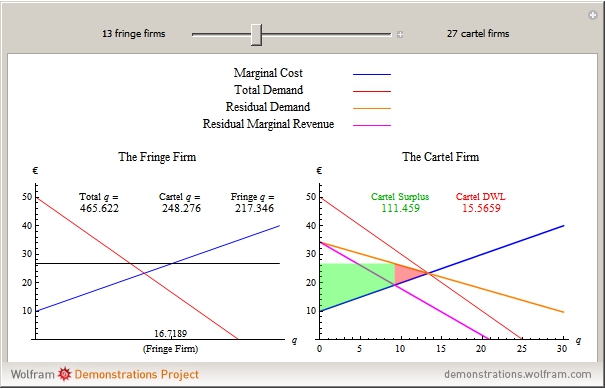Carlton D And Perloff Modern Industrial Organization Fourth Edition 2005

Written by two of the field's most respected researchers, Modern Industrial Organization goes beyond the traditional structure-conduct-performance framework by using the latest advances in microeconomic theory, including transaction cost analysis, game theory, contestability, and information economics. Fully updated to reflect new trends and topics, the Fourth Edition focuses on providing students with a clear, unified structure for analyzing theories and empirical evidence about the organization of firms and industries. Perloff is a professor in and chair of the Department of Agricultural and Resource Economics at the University of California at Berkeley. His textbooks are Modern Industrial Organization (coauthored with Dennis Carlton) and Microeconomics. Professor Perloff has been an editor of Industrial Relations and an associate editor of the American Journal of Agricultural Economics. He is currently an associate editor of the Journal of Productivity Analysis and edits the Journal of Industrial Organization Education. A fellow of the American Agricultural Economics Association, his economic research covers industrial organization, marketing, labor, trade, and econometrics.
Required Texts: Modern Industrial Organization, Dennis W. Carlton and Jeffrey M. Perloff, Fourth Edition (2005) and The Economic Structure of Intellectual. Term Paper: In order to provide an opportunity for independent study. Trove: Find and get Australian resources. Books, images, historic newspapers, maps, archives and more.
He has consulted with a number of nonprofit organizations and government agencies including the Federal Trade Commission and the Departments of Commerce, Justice, and Agriculture. Video konkurs nudistok.
%2C445%2C291%2C400%2C400%2Carial%2C12%2C4%2C0%2C0%2C5_SCLZZZZZZZ_.jpg)
Product Description Written by two of the field's most respected researchers, Modern Industrial Organization goes beyond the traditional structure-conduct-performance framework by using the latest advances in microeconomic theory, including transaction cost analysis, game theory, contestability, and information economics. Fully updated to reflect new trends and topics, the Fourth Edition focuses on providing students with a clear, unified structure for analyzing theories and empirical evidence about the organization of firms and industries. I've only used 9 textbooks in my undergraduate carrer in Economics, however, this book would probably fit either as the best or 2nd best.
I can't really determine which deserves the 'coveted' 'best' slot. To say firstly, this book passes the 'I havn't attended class for the last 4 weeks and only have read the book, but still recieved an A- for the midterm' test. I think I can say in full confidence that IO is pretty much a standard course and this pretty much covers all the standard topics that any IO course would cover in one semester.
I used this book for a more 'advanced' IO course (there are 2 in my university) and I used the book almost exclusively in preperation for my exams. I can say that the books appendices are excellent, despite th previous comment. It displays the material very concisely and in a very formal manner.
The presentation in the appendices is not laconic and is very understandable. I would have to say it achieves almost maximum effeciency with relevent material per page. Actaully, for my case, the appendices were very much more useful then the actaul text itself. The level of mathematics does not exceed a standard non-formal multi-variable calculus level and is thus very accesible. With regards to applicability of the material, I found no problems in figuring out how the forumale applied with respect to the theory for the most part. However, I suspect if it is obtuse (for the level of maturity in the class) then the instructor would augment the text with problem sets and excercises. The book starts off with a brief recap of the relevnt micro concepts and tools in the first chapter or so, then goes on to cover topics such as monopoly, oligopoly, monopolistic competition, games in oligopolies (Bertrand, Stakelberg Cournout-Nash etc.).
Blank posescheniya uroka psihologom. PORPORA, Paolo. Italian painter, Neapolitan school (b. 1617, Napoli, d. 1673, Roma) Preview Picture Data Info; Still-Life of Flowers c. 1660 Oil on canvas, 64 x 50 cm Private collection: Still-Life with Fungi-Oil on canvas Private collection: Still-Life with a Snake, Frogs, Tortoise and a Lizard. EFTALIA MAKRI – SKOTINIOTI and VASSILIKI ADRIMI – SISMANI. Les Sites Du Neolithique Recent Dans Le Golfe Pagasetique: La Transformation.